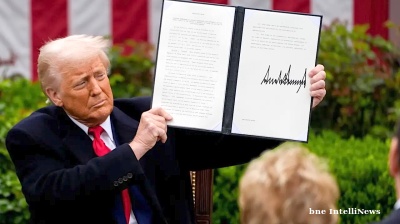Bulgaria’s Change Continues fell short by four MPs to secure a majority and form a new government, the party’s co-leader. who was nominated for prime minister, Assen Vassilev, said at a press briefing on July 8.
The party successfully formed a four-party coalition in December but There Are Such People (ITN) pulled its support for the cabinet of Prime Minister Kiril Petkov – Change Continues’ other leader – and triggered a no-confidence vote against the government. The motion was backed by all opposition parties, which had the majority to oust Petkov’s reformist government.
"In this parliament, we managed to find 117 [out of 240] MPs, we hope that in the next parliament people will secure us more MPs," Vassilev said.
For a majority, Change Continues needs at least 121 MPs.
After Vassilev returns the mandate to President Rumen Radev, the second-largest party in parliament, former ruling party Gerb, will get a second mandate. The party has repeatedly said that it will not attempt to form a coalition within this parliament and will return the mandate immediately.
It is still unclear which party Radev will pick for the third, and last, mandate. Change Continues’ two coalition partners – the Bulgarian Socialist Party (BSP) and Democratic Bulgaria – have said they would attempt to form a coalition if given the mandate. ITN has also said that it would try to form a coalition.
Analysts are sceptical that a third mandate could be successful, even though Hristo Ivanov, one of the leaders of Democratic Bulgaria, has said that his formation would negotiate for support even with ITN’s MPs.
However, Dnevnik news outlet reported on July 8 that the four parties, which were members of the ruling coalition, seem willing to take a new chance to rule together, but with the mandate given to Democratic Bulgaria.
Dnevnik quoted its sources as saying that members of some of the four parties have already held talks in that direction and would back a government led by Change Continues’ Nikola Minchev. Minchev was parliament speaker but was removed with the votes of ITN and the opposition parties without a specific reason given.
The young lawyer was seen as one of the most educated parliament speakers in Bulgaria and as a highly acceptable nomination for prime minister for all four parties. However, the third mandate seems unlikely to succeed if given to ITN or BSP.
After Bulgarians had to vote for parliament three times last year, a new early general election seems highly likely this autumn if the third mandate also fails. Radev has said that, if a government is not formed within this parliament, he would call the vote after September 15 when a majority of Bulgarians will be back from their holidays and theoretically a higher turnout could be expected.
According to recent polls, Gerb, which was leading Change Continues in the spring, is quickly losing support and Change Continues could win again. Moreover, the party and Democratic Bulgaria could run in coalition, which would bring more support as they have similar priorities and goals.
At the same time, the next parliament is set to be even more fragmented with seven parties passing the 4% threshold, including far-right and pro-Russian Vazrazhdane and pro-Russian Bulgarian Ascend. This would make the formation of a ruling coalition even harder than now and analysts expect that the next parliament will have a short life and a new early election will follow.
If Bulgaria does not have a functioning parliament, it risks losing billions in EU funds under the Recovery and Resilience Plan as it will fail to adopt 22 laws and reforms needed to unlock the funding.
Moreover, the country will not be able to move forward with its plan to adopt the euro as of January 1, 2024.
A caretaker government will also have very limited possibilities to support households and companies in the deepening economic and energy crisis. It can only stick to the budget revision adopted by parliament at the end of June. If the global or domestic situation changes, the government cannot revise the budget again without a functioning parliament.
There are also fears that a government appointed by Radev could bring Bulgaria back into the Russian orbit. The president, who won his second term last November with strong criticism of Gerb and chief prosecutor Ivan Geshev, has been seen as rather pro-Russian since the start of Moscow’s invasion to Ukraine.
Radev has strongly criticised Petkov’s government for refusing to accept Gazprom’s demand to pay gas bills in rubles, which led to a stop of Russian gas supplies for Bulgaria at the end of April.
The president also was rather critical towards the government for its decision to expel 70 Russian diplomats and has accused Petkov of betraying the Bulgarian interest in the dispute with North Macedonia. Subsequently, Radev changed his position towards a French proposal that would lift Bulgaria’s veto on North Macedonia’s EU membership talks.
News

Slovak PM Fico delays approval of EU’s sanctions package again, blaming Slovak opposition
Slovak populist Prime Minister Robert Fico has again delayed approval of the latest 18th round of EU sanctions against Russia, blaming his latest blocking on the opposition parties in Slovakia.
_1752601672.jpg)
Russia’s consumer spending motor runs out of fuel
A number of indicators point to the stagnation of consumer spending in Russia, which for years has been the main driver of economic growth.

China and Serbia to hold first joint military training exercise
China and Serbia will conduct their first-ever joint military training exercise later this month in northern China’s Hebei Province.

Baltic States face surge in fatal overdoses as nitazenes flood region
A powerful and little-known synthetic opioid called nitazene is fuelling a deadly drug crisis across the three Baltic States, with Estonia reporting a threefold rise in overdose deaths in recent years.




